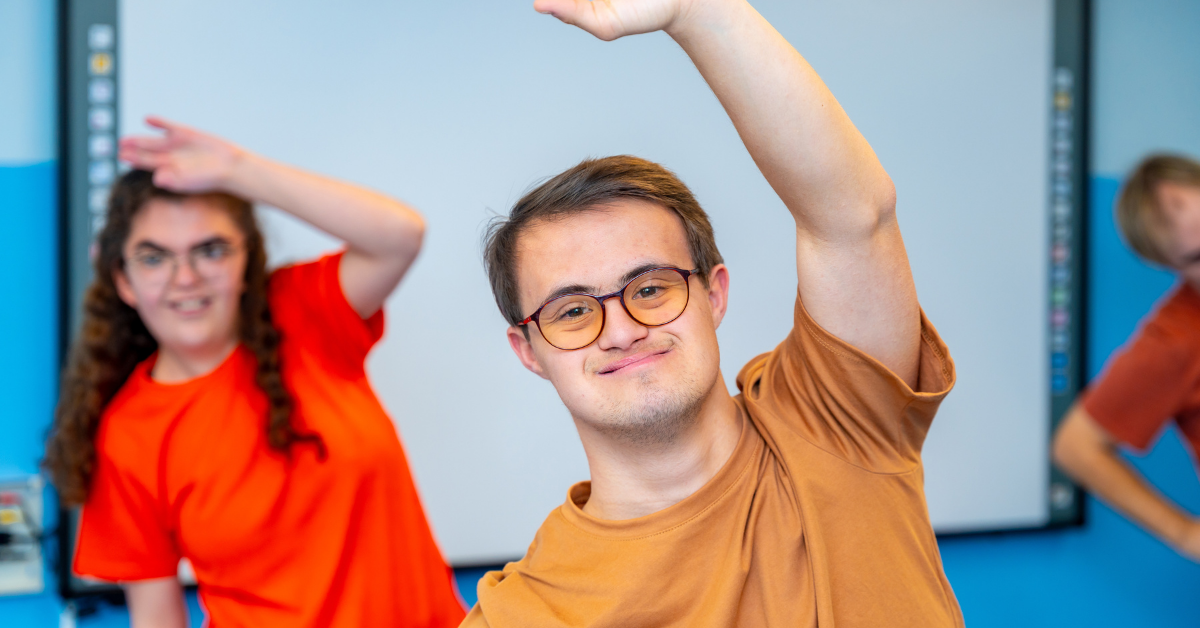Fall Fitness: Adaptive Exercise Programs for Adults with I/DD
As the crisp autumn air settles over the region, the Trudeau Center is helping adults with intellectual and developmental disabilities embrace the season through adaptive fitness programs that support both physical health and overall wellbeing. Fall offers unique opportunities for outdoor activities and exercise routines that can be tailored to meet diverse abilities and preferences.
The Connection Between Physical Activity and Quality of Life
For adults with I/DD, regular physical activity extends far beyond simple exercise. We see it as a pathway to enhanced independence, improved mental health, and meaningful community participation. Research consistently shows that adults with developmental disabilities who engage in regular physical activity experience better health outcomes, improved mood, and greater confidence in their daily lives.
At the Trudeau Center, our approach to fitness recognizes that every individual has unique strengths, challenges, and interests. Through our Day Program and Recreation Program, we create adaptive exercise opportunities that celebrate what participants can do while gently expanding their comfort zones.
“Physical activity isn’t just about moving your body, it’s also about building confidence, connecting with others, and discovering what you’re capable of,” explains Mark Rowe, Program Coordinator for Adult Services at the Trudeau Center. “We’ve seen adults who were initially hesitant about exercise become enthusiastic participants when they find activities that match their interests and abilities. That transformation is incredibly rewarding to witness.”
Fall-Focused Fitness Activities
The autumn season provides a perfect backdrop for varied fitness activities that keep exercise engaging and enjoyable. Walking programs take on new appeal as participants experience changing foliage and cooler temperatures. Local parks and trails become accessible fitness venues where adults can build cardiovascular health while enjoying nature’s seasonal display.
Adaptive sports programs also gain momentum in fall, with modified versions of traditional activities allowing full participation regardless of ability level. Basketball, bowling, and group fitness classes can all be adapted to ensure everyone experiences the joy of movement and the satisfaction of improving their skills.
Outdoor fitness activities during fall might include:
- Nature walks through Rhode Island’s scenic parks and trails
- Adaptive hiking with appropriate supports and accommodations
- Outdoor yoga or stretching sessions in comfortable weather
- Modified team sports focusing on participation and fun
- Gardening activities that combine gentle exercise with purposeful work
Creating Inclusive Fitness Environments
The key to successful adaptive fitness programs lies in creating environments where all participants feel welcome, supported, and capable. This means providing appropriate modifications, using person-centered approaches, and celebrating progress at every level.
Staff members work closely with participants to identify fitness goals that are meaningful to them – whether that’s building strength for greater independence in daily activities, improving balance and coordination, or simply finding enjoyable ways to stay active. This individualized approach ensures that fitness programs support each person’s broader life goals.
“We take time to understand what motivates each individual,” notes Rowe. “For some adults, fitness is about preparing for a job through Employment Concepts. For others, it’s about having more energy to participate in social activities or managing health conditions. When we connect fitness to personal goals that matter, participation and progress naturally follow.”
Health Benefits Beyond the Physical
While the physical health benefits of regular exercise are well-documented – improved cardiovascular health, better weight management, stronger muscles and bones – the mental health and social benefits are equally significant for adults with I/DD.
Group fitness activities provide natural opportunities for social connection, helping combat the isolation that some adults with developmental disabilities may experience. The structure and routine of regular exercise programs also contribute to emotional regulation and reduced anxiety. Additionally, achieving fitness goals – no matter how small – builds self-esteem and reinforces the belief that growth and improvement are always possible.
Making Fitness Accessible Year-Round
As autumn progresses and eventually gives way to winter, the Trudeau Center’s commitment to adaptive fitness continues. Indoor alternatives ensure that adults can maintain their fitness routines regardless of weather conditions. The Day Program incorporates movement throughout daily activities, making physical activity a natural part of each day rather than an isolated event.
For families and caregivers, fall fitness programs offer an opportunity to support their loved ones’ health goals while respecting their autonomy and preferences. The Trudeau Center welcomes collaboration with families to create fitness plans that extend beyond program hours, incorporating movement and activity into community and home settings.
Get Moving This Fall
The Trudeau Center’s Recreation Program and Day Program offer numerous opportunities for adults with I/DD to embrace fall fitness in ways that are enjoyable, effective, and tailored to individual needs. As one of the few human service organizations in Rhode Island serving individuals at all life stages, Trudeau brings more than 60 years of experience to creating programs that truly make a difference.
AI may have been used in the initial drafting and research of this article. The information provided is for educational purposes only and is not intended to be, nor should it be interpreted as, medical, therapeutic, or individualized service advice. Every person’s needs and circumstances are unique. For information about services specific to you or your loved one, please contact the Trudeau Center.









